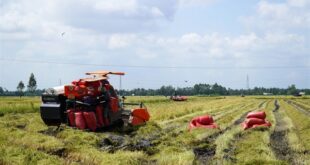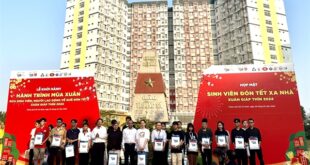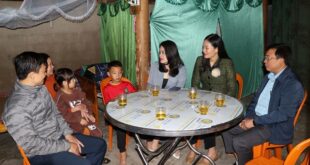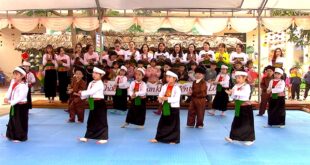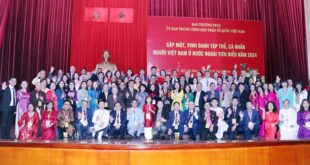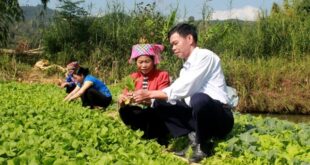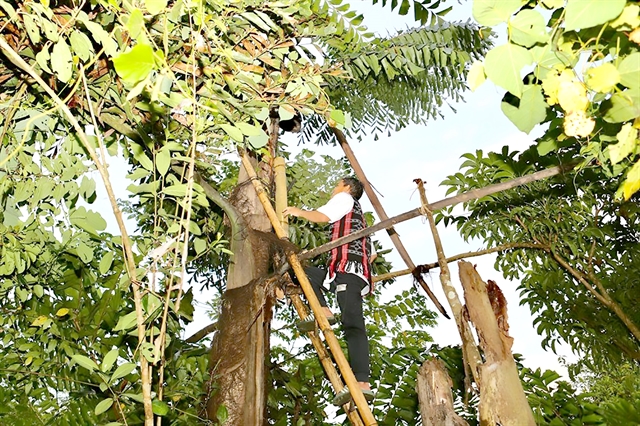 |
| A Cơ Tu ethnic man is collecting Tr’din syrup from a tree. — Photo baotianguyenmoitruong.vn |
QUẢNG NAM — A businessman in the central province of Quảng Nam is successfully helping ethnic people do clean and green farming and sell carbon credits.
Starting with an effort to create sustainable livelihoods for people in mountainous areas of Quảng Nam from native plants, now Phạm Thanh Hoàng, director of Tây Giang Forest Food Joint Stock Company, has boldly participated in the carbon credit market, towards green and sustainable business.
Hoàng said that during charity trips in the mountainous districts of Quảng Nam Province, he was often treated by Cơ Tu ethnic people to a fragrant drink with the flavour of the mountains and forests called Tr’din.
This drink is considered to carry the essence of the mountains and forests, extracted from the precious resin drops of the Tr’din tree that is only found in the Tây Giang District of Quảng Nam Province.
This is also a precious medicinal herb.
Finding that Tr’din is both nutritious and brings many benefits to community life, he collaborated with the ethnic people to cultivate the trees and expand the raw material area with the initial purpose of producing canned Tr’din drink.
Since then, a close relationship between the businessman and the Cơ Tu ethnic people started.
Through many years of research, Hoàng and his colleagues have found natural sugar from the Tr’din tree (also known as Tr’din syrup), a healthy sugar containing the active ingredient polyphenol to treat diabetes.
Tr’din syrup with a low Glycaemic Index (GI) does not cause increase of blood sugar levels and contains antioxidants, vitamins and minerals that enhance resistance similar to natural honey.
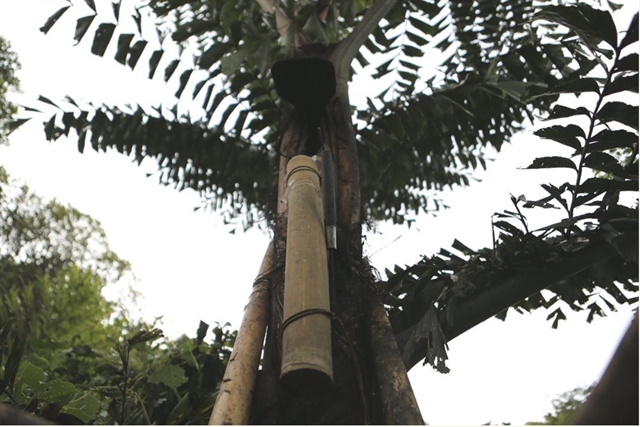 |
| A Tr’din tree from which the natural syrup is tapped. Photo baotainguyenmoitruong.vn |
“Nurturing and planting Tr’din trees in Tây Giang District not only develops raw material areas for production, and creates sustainable livelihoods for the local people, but also contributes to increasing forest coverage, regenerating forests and preserving water sources, thereby reducing the impact of climate change and greenhouse emissions, and regenerating ecosystems and habitats for animals and plants and neutralising carbon, aiming to achieve the Net Zero target”, Hoàng said.
In addition to developing products from the Tr’din tree, Hoàng also established four co-operatives of clean agricultural products and medicinal herbs to connect the harvesting and consumption of organic agricultural products for Cơ Tu people.
Agricultural products such as ginger, turmeric, chili, bamboo shoots, bananas, oranges, and Ngọc Cẩu mushrooms are completely grown and produced according to organic standards, which are well received by consumers.
The production has created sustainable livelihoods for hundreds of households in the mountainous region of Quảng Nam.
A Lăng Nia, a resident of Axan Commune of Tây Giang District, said that previously, people in the village did not consider economic development from forests.
Since joining Hoàng’s Tây Giang Forest Agricultural Co-operative, people have learned how to take advantage of their mountain and forest specialties to enrich themselves, said Lăng Nia.
Ambition of selling carbon credits
Not only creating sustainable livelihoods for ethnic minorities in districts of Tây Giang, Nam Giang and Hoà Vang from organic agricultural farming, Hoàng also ambitiously launched another special product. It is credits of carbon emissions from the raw materials areas.
Recently, Tây Giang Forest Food Joint Stock Company and GEEZ NET-ZERO Joint Stock Company signed a strategic co-operation agreement on promoting and developing activities related to carbon credit transactions and transfer of emission rights, including carbon credits.
Hoàng said that each country, organisations and individuals will have a certain carbon emission quota.
If the licensed quota is not used up, it can be resold to countries or organisations whose emissions exceed the allowed quota, he said.
For Việt Nam’s agricultural sector, if people produce low greenhouse gas emissions and do not use up the quota, they can sell it to other countries and organisations for financial gain.
Therefore, the project has registered to prepare a greenhouse gas inventory report according to ISO 14064-1:2018, Decree 06/2022/ND-CP and ISO 14067 on carbon tracing, he said.
“The entire process is aimed at green, clean production, without discharging into water sources, and decarbonisation in the supply chain to protect the environment and not cause harm to humans, and to be very suitable to participate carbon credit market so that people can have more profits”, he said.
“Our desire is that participation in the carbon credit selling market will contribute to promoting green solutions and reducing greenhouse gas emissions and global climate change, and protecting the ecosystem and environment,” he added. — VNS
- Reduce Hair Loss with PURA D’OR Gold Label Shampoo
- Castor Oil Has Made a “Huge” Difference With Hair and Brow Growth
- Excessive hair loss in men: Signs of illness that cannot be subjective
- Dịch Vụ SEO Website ở Los Angeles, CA: đưa trang web doanh nghiệp bạn lên top Google
- Nails Salon Sierra Madre
 VnExpress News The News Gateway of Vietnam
VnExpress News The News Gateway of Vietnam
